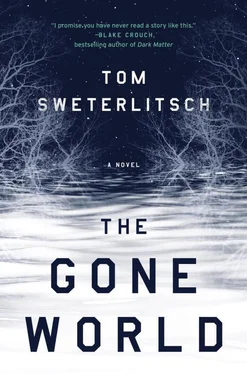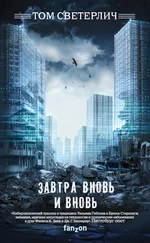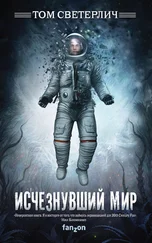Том Светерлич - The Gone World
Здесь есть возможность читать онлайн «Том Светерлич - The Gone World» весь текст электронной книги совершенно бесплатно (целиком полную версию без сокращений). В некоторых случаях можно слушать аудио, скачать через торрент в формате fb2 и присутствует краткое содержание. Город: New York, Год выпуска: 2018, ISBN: 2018, Издательство: G. P. Putnam's Sons, Жанр: Детективная фантастика, Триллер, на английском языке. Описание произведения, (предисловие) а так же отзывы посетителей доступны на портале библиотеки ЛибКат.
- Название:The Gone World
- Автор:
- Издательство:G. P. Putnam's Sons
- Жанр:
- Год:2018
- Город:New York
- ISBN:978-0-39916-750-8
- Рейтинг книги:5 / 5. Голосов: 1
-
Избранное:Добавить в избранное
- Отзывы:
-
Ваша оценка:
- 100
- 1
- 2
- 3
- 4
- 5
The Gone World: краткое содержание, описание и аннотация
Предлагаем к чтению аннотацию, описание, краткое содержание или предисловие (зависит от того, что написал сам автор книги «The Gone World»). Если вы не нашли необходимую информацию о книге — напишите в комментариях, мы постараемся отыскать её.
The Gone World — читать онлайн бесплатно полную книгу (весь текст) целиком
Ниже представлен текст книги, разбитый по страницам. Система сохранения места последней прочитанной страницы, позволяет с удобством читать онлайн бесплатно книгу «The Gone World», без необходимости каждый раз заново искать на чём Вы остановились. Поставьте закладку, и сможете в любой момент перейти на страницу, на которой закончили чтение.
Интервал:
Закладка:
Tom Sweterlitsch
THE GONE WORLD
FOR SONJA AND GENEVIEVE
If I have heard correctly, all of you
can see ahead to what the future holds
but your knowledge of the present is not clear.


PROLOGUE
She had been warned she would see things her mind wouldn’t understand. In a dead forest, in winter—never-ending winter, the trees blackened from old fire and coated with ice, several trunks toppled, a lattice of charred sticks. Climbing across the field of dead pines for hours, but her space suit kept her warm, a thin-profile suit that allowed her a range of motion to keep moving. The space suit was orange, the color for trainees: this was her first excursion to a far-future Earth. Everywhere she looked, in every direction, she saw the frost-blanched sky and the snowy ground crosshatched by fallen trees. There were two suns—the pale disk of the sun she knew and the garish white radiance of the phenomenon her instructor had called the White Hole. This was once West Virginia.
She had ranged far from base camp and grew worried about finding her way back to the Quad-lander in time for extraction. A dosimeter measured her amount of radiation exposure, a color blotch that had dimmed over the past few hours from bright green to a green the color of pond scum. She had become infected by this place, the air and soil here polluted by a vapor of metal, particles minuscule enough to pass through her suit, into her body. QTNs, her instructor had called them—quantum-tunneling nanoparticles, he had said. She had asked her instructor if QTNs were like a swarm of robots, but he said to think of them more like cancer—that they’d house within the microtubules of her cells, and once enough of them had taken residence within her, she would be lost. Not death, he elaborated, not exactly—he told her that she would see what QTNs do with human bodies, but that her intuition might reject what she was seeing, that she might be filled with revulsion, that she might feel a violent need to unsee .
One of the burnt trees still stood, a barren pine whitened by a skin of ash—and when she passed the burnt-white tree, the landscape changed around her. She was still in the forest, in winter, but the trees were no longer burned, fallen. The pines were lush now, green, though snow-covered. Ice bent the boughs of distant pines vague through the scrim of snow. How did I get here? She looked behind her: no tracks, not even her own. I’m lost. She pushed through branches and needles, exhausted from the effort of lifting her steps from the drifts. She passed another burnt white tree identical to the first she had seen—dead, its ashen branches skeletal. Or was it the same tree she had passed? I’m turned around , she thought . Clambering over roots and stones, sliding down snow, trying to find something familiar, some land feature she could recognize, she pushed through a gap between pines and came to a clearing, to the shore of a black river. She screamed when she saw the crucified woman.
The woman had been crucified upside down, but there was no cross; she was suspended midair, hovering above the black water. Fire burned at her wrists, her ankles. The woman’s rib cage was stretched, protruding, her body diminished, thinned to the point of starvation; her legs were striated black with gangrene. Her face was livid, purple, a pooling of blood, and her hair, pale blond, dangled low enough to touch the surface of the water. She recognized herself as the crucified woman and she fell to her knees on the shore of the black river.
A trick of the QTNs , she thought. It was repugnant, this absurdity. They’re inside me, making me see these things—
Panic lurched within her at the thought of QTNs accumulating in her cells, her brain—but even so she realized this was no hallucination, that the crucified woman was real, as real as she was, as real as the river and the ice and trees. She thought to cut the woman down but was horrified to touch her.
Her meter changed from green to mustard yellow and she ran, activating her retrieval beacon, trying to remember her extraction point—but the forest surrounding the river was unfamiliar, and she was lost. She backtracked the way she thought she had come, buffeted by icy wind, slipping in snow. She passed another white tree, identical to the others— or no, it must be the same … a burnt pine, its bark a carapace of ash. The yellow of her meter had darkened to the shade of reddish clay. No, no, no , she thought, running again, ducking through a clutch of branches. The meter flashed brilliant red. Nausea swept over her and she collapsed, brought down by the heaviness in her blood. She crawled forward through a break in the trees and found that she had arrived again at the clearing by the shore of the black river, to the scene of her crucifixion, but there were innumerable crucifixions now, thousands of bodies hovering upside down along the length of the river, nude men and women screaming in the light of two suns.
“What is happening?” she said out loud, to no one.
Her vision dimmed, she gasped for breath. When she saw flashing lights in the sky, she thought she might be losing consciousness, but they were the lights of one of the Quad-landers, a module named Theseus . The retrieval beacon , she thought— I’m saved . The Quad-lander bounced in the clearing before settling onto the ice.
“Here,” she said, her voice weak. She tried to scream: “I’m over here.”
Two men in slim olive space suits worn by the Navy scrambled out of the hatch, and she saw them approach the river. “I’m here,” she said, but the men were too far away to hear her. She tried to crawl from the tree line, she wanted to run to them, but she lacked the strength to stand. She saw the two men wade into the river, hip-deep, and saw them pull the crucified woman from the air, cradle her. They wrapped the woman in heavy blankets.
“No, I’m here, I’m here ,” she said, but watched them carry the crucified woman, that other version of herself, on board the lander.
“I’m here,” she said, “please.” Her meter darkened to muddy brown, the next color would be the lethal shade of black. She closed her eyes, waiting.
The mule kick of the thrusters shocked her into consciousness, and she recognized where she was—she was in one of the Quad-lander’s pods, she realized, her wrists and ankles strapped to the cot, her head and neck secured in a padded block. She was numb, shivering, covered in blankets that were tied down at the edges. The g-force of their liftoff abated, and she felt weightlessness.
“Please,” she said, “go back. I’m down there, please go back , don’t leave me—”
“You’re all right, we’ve got you now,” said her instructor, floating through the pod to her bedside. He was a much older man, with silvery hair, though his blue eyes seemed young. His hands were leather-soft when he checked her pulse. “Your wrists and ankles will be in considerable pain,” he said. “I don’t know how you were bound, but you suffered burns. You suffered from the exposure, extensive frostbite. Hypothermia.”
Читать дальшеИнтервал:
Закладка:
Похожие книги на «The Gone World»
Представляем Вашему вниманию похожие книги на «The Gone World» списком для выбора. Мы отобрали схожую по названию и смыслу литературу в надежде предоставить читателям больше вариантов отыскать новые, интересные, ещё непрочитанные произведения.
Обсуждение, отзывы о книге «The Gone World» и просто собственные мнения читателей. Оставьте ваши комментарии, напишите, что Вы думаете о произведении, его смысле или главных героях. Укажите что конкретно понравилось, а что нет, и почему Вы так считаете.




![Том Светерлич - Завтра вновь и вновь [litres]](/books/401288/tom-sveterlich-zavtra-vnov-i-vnov-litres-thumb.webp)
![Том Светерлич - Исчезнувший мир [litres]](/books/420722/tom-sveterlich-ischeznuvshij-mir-litres-thumb.webp)






